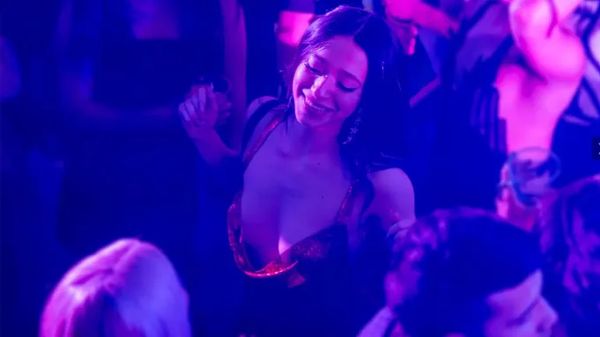Eye For Film >> Movies >> Anora (2024) Film Review
Anora
Reviewed by: Andrew Robertson

"Why make a tragedy of it?" is a later line in Anora's headlong rush. It's not quite a thesis, more a lens to examine an intoxicating and enchanting tale that reminds us for every happily ever after there's a never to be seen again. Comparison to Pretty Woman is perhaps a product of a lack of exposure to other films. The less obvious but more accurate comparisons are to The Girlfriend Experience and Uncut Gems and Shiva Baby. For a start Anora's a New York story, Coney Island and not Rodeo Drive.
That's from rabbits, not horses, and the running isn't freedom but fear. Plenty of another thing rabbits are famous for before then, as Anora, Ani, works off the books. Ivan, Vanya, is a child of wealth, and Ani, scarcely months older but much wiser, is not. Mikey Madison has had major film roles before but this is still an astonishing arrival, a signal of a real talent. Working in more than one language, more than one meter, she's more than capable of holding her own as the action moves from the salty to the sweeter. Mark Edyelshteyn is her prince charming, like the touch of a cursed needle on spinning wheel, an enchanting prick.
Writer/director/editor Sean Baker is working in the same oeuvre as his previous films, and I do not want that to be interpreted as a criticism. That it's shot on film gives it a certain gritty gloss that works ably for tales of the precariat. Lens flare serves as a marker of reality at times, but at others it's emotional grounding that makes the feeling one of truth. I was reminded of The Death Of Stalin for a few reasons, including the terror of the terrorised. The breadline and the boardroom, the strip club and the secretariat, all have their pecking orders, their climbers, their collaborators. Capital corrupts, distorts, but humans can hurt each other in ways without wealth to make it worse.
There's dreams, new year and not midsummer, Las Vegas of the prosperous and not islands of Prospero, and ogres too. A trio of toughs will take Ani through "all fucking night" on a quest with bleak consequences. Toros (frequent Baker collaborator Karre Karagulian), Garnick (Vache Tovmasyan) and Igor (Yura Borisov) are a trio of bears sent to catch a rabbiting ward. I was reminded of any number of the Coen's thickish thugs, as these stooges struggle to keep up. Borisov's a revelation too, there's something in the class solidarity of henchmen and hostesses. Toros at the christening is a moment of comedy in a film whose quality is more consistent than its tone.
Some moments threw me a little. The film uses a Robin Schulz re-working of a Take That track, featuring Britain's got talent competitor Calum Scott. A 2023 version of a 2008 song, the remix by German dance-music producer Schulz was to promote the Take That jukebox musical. That's a lot of industry shenanigans but it's stranger still to hear that band in a US context. It's even stranger to hear it a second time over an emotional moment. That's especially in comparison with tracks by acts like Fortnoxpockets, PsYcHoNaUt XIII (camel case and all), Red Hammer and Andy Darling.
Those last two have much closer ties to what amounts to a retro-revival of post-Soviet 'gopnik' styling, Adidas tracksuits and all. It did help that I knew which Eighties motors and trainers worked for the pose that was a Slavic squat but it's not essential. What is more necessary is a bit of parallel processing, as Anora's polyglot plot is sometimes simultaneous. Several conversations in a car are subtitled from one language while different dialogue is brought to the audible fore, and that is perhaps at the edges of comprehension. It works, as does Uncut Gems, to build tension, but as with that film it's an artistic element that's not necessarily enjoyable. Armenian, Russian, New York English which is its own vernacular beyond the accent, all take a bit of getting used to. "I've no idea I just got here" is another line that serves less as thesis than lens.
The elements of fairy tale include what one might call a wicked queen, though it's a bit of a glow-up from a carriage to a Bombardier Global Express. The more prosaic locations include ice-cream parlours, not ice-palaces, but VIP lounges become easily vipers' nests. There are moments of sex, and violence, and in both how people move tells us about them. It's in action that character is revealed, deed and not word. Legal documents manage to be both, and for whom and how systems work is itself a product of the people within them. A story sufficiently personal that it's eponymous, Anora briefly mentions the meanings of names. There's a cart-loader, a gift of god, god is gracious, a warrior, honour, light, grace. We're told names don't have meanings in America, but the fact that it's specified beyond 'here' puts the lie to it. What isn't untrue is that Anora is brilliant. "Why make a tragedy of it?" Why indeed? Anora asks, and in the asking makes a triumph.
Reviewed on: 29 Oct 2024















